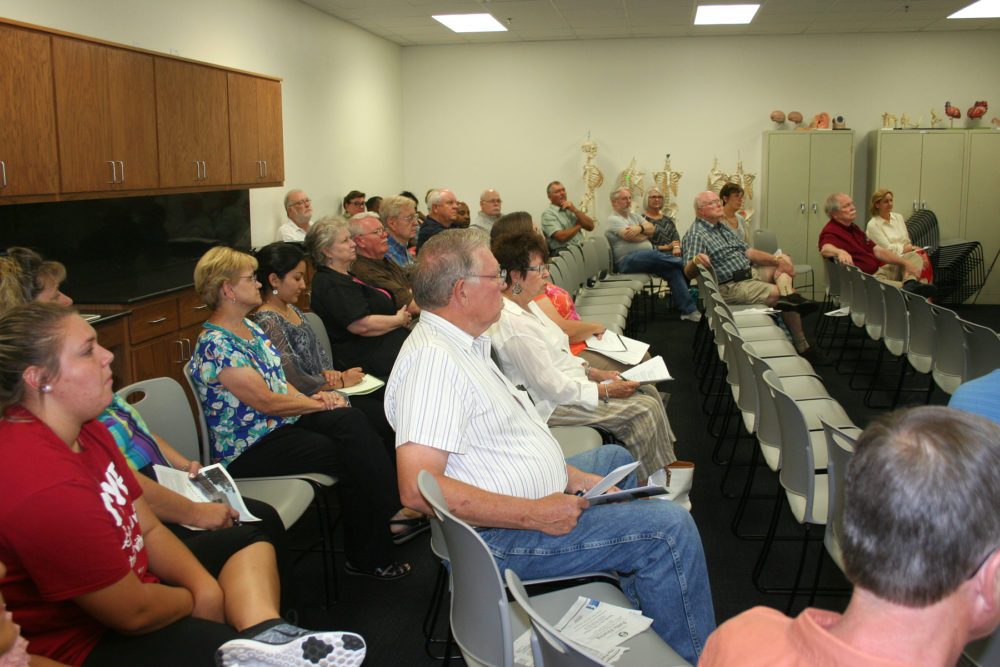 Stating a desire to be transparent, Dr. Pam Anglin, President of Paris Junior College, addressed a small group of Hopkins County citizens regarding the November 8th ballot proposal to include Hopkins County in the PJC District. It would mean a new tax at 10-cents per $100 evaluation. Dr. Anglin pointed to the advantages of the community college as well as discussing the tax.
Stating a desire to be transparent, Dr. Pam Anglin, President of Paris Junior College, addressed a small group of Hopkins County citizens regarding the November 8th ballot proposal to include Hopkins County in the PJC District. It would mean a new tax at 10-cents per $100 evaluation. Dr. Anglin pointed to the advantages of the community college as well as discussing the tax.
Como-Pickton School District and the Saltillo School District will not be included in the district. The two districts are included in the Northeast Texas Community College District. Thus, Sulphur Springs, North Hopkins, Miller Grove, Cumby, and Sulphur Bluff will be included in the district and receive the benefit of reduced tuition while paying the additional property tax.
Currently students in Hopkins County pay $100 per semester credit hour. If the county joins the PJC District, student tuition rates would fall to $55 per semester credit hour. Thus a typical 3-hour course costs $300 for out of district students. With the proposed change, county students attending PJC would save $135 and pay only $165 for the 3-hour course.
If the proposal is passed in November, the tax rate would begin paying the property tax in Fall 2017 and new, lower tuition rates for the new in-district residents would begin in the 2017-2018 academic year. The Board of Regents would also implement a plan to change board representation based on the redistricting that will result in the election.
Currently, those residing in the City of Paris and the former Cunningham ISD comprise the PJC District and pay .1875-cent property tax rate. That rate would lower with the addition of other counties to the district. The college district currently has a $0.00 tax rate per valuation for Debt Service from voter approved bond referendum elections. The maximum rate the board could adopt is 27-cents and the maximum debt service rate that the board could every offer voters in a bond referendum is 50-cents. Citizens over 65 and surviving spouse will receive a $10,000 property value exemption and the taxes are frozen for those seniors.
Just over 50% of the 2015 high school graduates in Miller Grove, North Hopkins, and Sulphur Springs have benefitted from PJC courses either through duel credit courses, college credit courses, technology courses, or chose PJC as their higher education institution. Just under 50% in Cumby and Sulphur Bluff chose PJC courses. Some high school students actually graduated with their Associates degree prior to receiving their high school diploma at graduation.
Advantages to the community played a large role in the presentation made by Dr. Anglin. She pointed to the economic gain brought about by programs offered. She noted critically needed fields such as health care, emergency services, manufacturing, biomedical science, HVAC and welding. She stated that based on agreements with M D Anderson and the University of Texas Health Science Department, students that maintain a 3.5 grade point average in approved courses are automatically accepted into the biomedical program leading to a Bachelors degree in biomedical research. An agreement with Texas A & M University also allows students with a 3.6 grade point average to be automatically accepted into programs that lead to biomedical studies include the Veterinary Science field. In manufacturing, the college currently provides students with technical training in Mechatronics, CAD, 3-D printing, and Machining. The Small Business Development Center provides training and services for the region. Customized training assists businesses and organizations in employee training. PJC partners with the Texas Workforce Commission, Workforce Solutions Northeast and North Central Texas, Economic Development Corporations and Chambers of Commerce.
If the tax base for PJC does not increase, the school faces increased tuition and fees to students, reduction of services, and possible closure by the Texas Legislature if they chose to close a number of community colleges. The Legislature did seek to close five colleges recently but 50 community colleges in Texas took a cut in funds received to enable the five to remain open. Dr. Anglin says that will not happen again. The schools cannot afford it.








